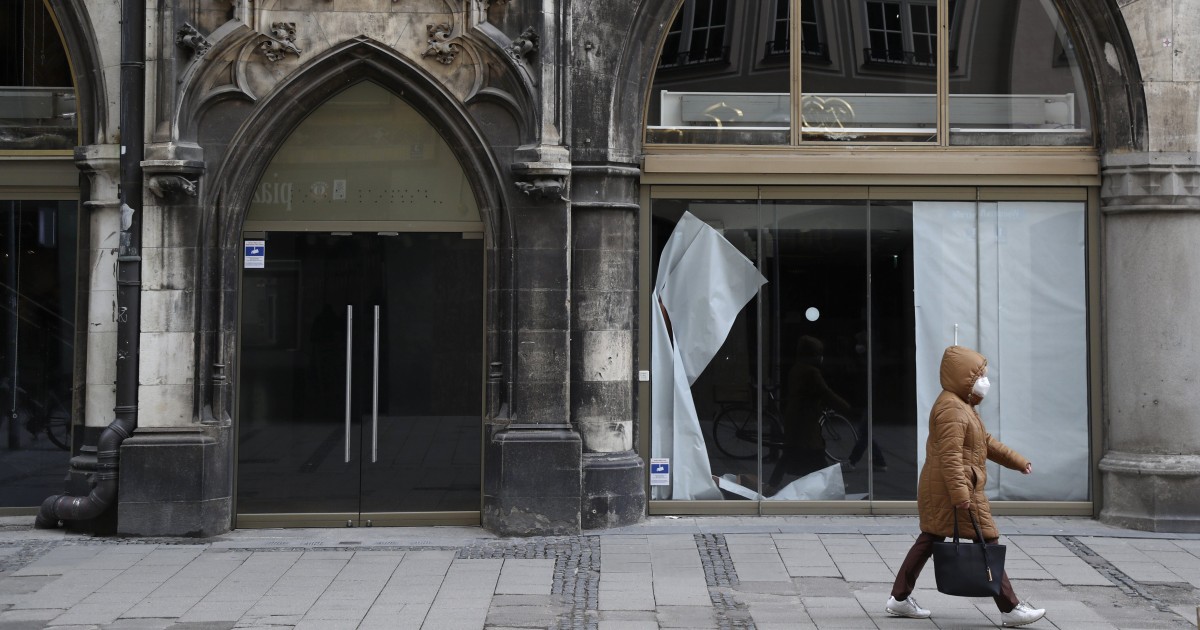BERLIN – Germany is extending its blockade until April 18 and urging citizens to stay home for five days during Easter holidays to try to break a third wave of the Covid-19 pandemic, Chancellor Angela Merkel said Tuesday morning. market.
In negotiations that lasted until the wee hours of the night, Merkel pressured the leaders of the 16 German states to take a tougher stance to combat the pandemic, reversing the plans for a gradual reopening of the economy agreed earlier this month after a sharp increase in the infection.
“Now we are basically in a new pandemic. The British mutation has become dominant,” Merkel told a news conference.
“Fundamentally, we face a new virus of the same type, but with very different characteristics. More deadly, more infectious and infectious for a longer time.”
Complete coverage of the coronavirus outbreak
Germany began to reduce restrictions cautiously earlier this month. But the spread of more infectious variants of the virus has increased cases, raising concerns that hospitals could soon be overburdened without further restrictions.
The number of cases per 100,000 people over a week was 107 on Monday, above the level at which intensive care units will be overloaded. More than 3,000 people with Covid-19 are in intensive care.
On Monday, Britain demanded that the European Union allow the delivery of the Covid-19 vaccines it ordered, while tensions over a possible export ban for vaccines manufactured in the EU increased and Brussels pointed an accusing finger at the manufacturer. AstraZeneca vaccines.
After falling far behind Britain and the post-Brexit United States in launching vaccines, EU leaders are expected to discuss a possible ban on vaccine exports to Britain at a summit on Thursday.
“We have a problem – which was known – with AstraZeneca,” said Merkel, adding that she supported the European Commission. “We will decide responsibly.”
For five days, starting April 1, Germans must stay at home and reduce contacts as much as possible. But the night deal did not include closing all stores, including essential stores like supermarkets, which Merkel had ordered.
Large family gatherings will be prohibited during the holidays, with a maximum of two families, or up to five people, and may be reunited. The government will ask churches to hold Easter services online to avoid meetings.
Economists said the extension of Germany’s blockade measures would delay a long-awaited recovery in Europe’s largest economy from spring to early summer.
Easter trip
The negotiations dragged on for hours, while Merkel and state leaders were at odds over the possibility of easing restrictions on domestic travel over the Easter holiday.
Germans can travel freely, even in the midst of the pandemic, but the country’s hotels and holiday resorts cannot rent rooms for tourists. With that, traveling abroad is the only option for those who are desperate to go on vacation.
“We advise against all trips abroad,” said Merkel.
Airlines will now be responsible for ensuring that all travelers and crew are tested for coronavirus prior to departure for Germany, regardless of the infection rate in the country they have visited.
But Merkel and state leaders have stopped imposing mandatory quarantine on all returning travelers, a relief for holiday destinations like Mallorca Spain, which is betting on a boost with Easter travel deals.
Merkel said Germany is in a race against time to vaccinate its population before new variants of the coronavirus take over. About 9 percent of Germans received at least one vaccine injection, but the pace of vaccinations is expected to increase next month.
“Things have been difficult for longer than we expected, but there is a very clear light at the end of the tunnel,” said Merkel.

